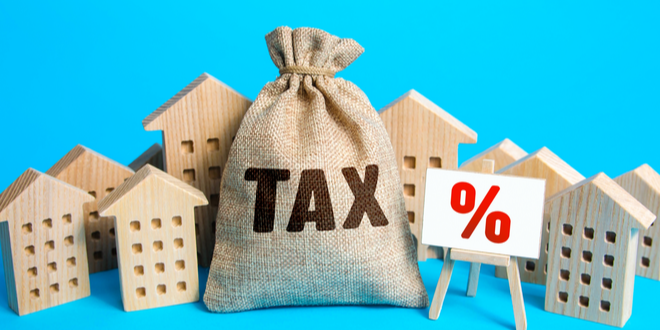This fall, Perris voters will decide whether the city will place a special tax on logistics facilities.
Measure A, which will appear on the Nov. 7 ballot, proposes putting an annual tax of up to 10.7 cents per square foot on any facility that is used primarily as a distribution operation or an industrial business, according to the staff report.
The business license tax, which requires a two-thirds majority vote to become law, would be adjusted annually for inflation. If the consumer price index doesn’t go up in a particular year, or if prices are flat, the tax rate will not be adjusted.
During its June 13 meeting, the council voted unanimously to place Measure A on the ballot. If approved, the tax will take effect immediately and remain in place for 30 years.
Currently, industrial and distribution facilities in Perris pay a $104 business license fee to the city every year.
If approved, Measure A could raise as much as $4 million a year for the operation, maintenance, repair, and restoration of the city’s roads. That would include truck routes, collector streets, and arterial streets.
“During the last 15 years, the number of large distribution facilities, and certain industrial businesses, located within Perris, has grown, with additional projects proposed or currently under review,” the report states.
“This growth has increased traffic in Perris, which has increased the city’s costs relating to the improvement, operation, maintenance, repair, and/or restoration of Perris public roads.”
Measure A revenues would be controlled exclusively by the city. Neither the state, the county, nor any other government agency will be allowed to use those revenues, which will be audited every year to make sure they’re being spent as intended.
“It’s important to understand that the voters, not the council, are going to decide this,” Mayor Michael M. Vargas said during the council meeting. “Also, we’re setting the ceiling at 10 cents per square foot, we aren’t starting there. If Measure A gets passed, we could start the tax at six cents per square foot.
“But we have to do something, and we have to set the bar high.”
Perris is following in Redlands’ footsteps, which passed Measure J in November. That raised the city’s business license tax on warehouse-distribution operations from 4.7 cents to 10.5 cents per square foot.
Jurupa Valley, Colton, Riverside, and Chino have passed similar measures recently.
Perris is also battling Menifee regarding a two-building industrial project Menifee approved in June that is right on Perris’ border. That project, which would be built south of Ethanac Road on the west side of Barnett Road, has Perris officials concerned about extra traffic and other potential environmental issues.
Perris has filed a lawsuit asking Menifee to take a second look at the project, including a more detailed traffic study. That matter is pending.
If it passes, Perris officials do not expect Measure A to slow industrial development in the city, said Ernie Reyna, deputy city manager.
Besides raising money to pay for better roads and streets, Measure A will help Perris maintain its quality of life and keep the city “on the right track” without raising taxes on its residents, according to a statement signed by Vargas and council member and Malcolm Corona, both of whom voted for the business tax.
“The city has done all it can to keep [its] roads safe, but the increase in distribution facilities, warehouses, and industrial businesses has strained public roads and arterial streets, making it harder for residents to get around,” the statement reads.
“This is why we need Measure A.”
Not according to Devon Sulli, executive director of Inland Empire-NAIOP, the local chapter of the North American trade association that represents more than 20,000 developers, landowners, and other professionals in office and industrial real estate.
Measure A is a “job-killing double tax” that will damage warehouse-distribution development in Perris and that could not have been proposed at a worse time, Sulli writes in a rebuttal to the city’s justification of the ballot measure.
“Warehouse facilities in Perris already pay for road, sidewalk, parks, and other community improvements,” Sulli writes. “Developers already pay roads and bridge district fees to cover the cost of road and bridge improvements.
“[Now] the city council wants to impose a $120 million tax to fund road improvements when the city is already sitting on millions in unspent taxes and fees.”
One developer questioned the size of the proposed tax and its timing.
“This is a rather high tax, particularly when you consider the state of the economy right now,” said Kamran Benji, co-founder of Blue Arch Investment Inc, a Los Angeles-based real estate group, which is planning to build a Class A industrial building in Perris “Many industrial tenants are struggling, and we’re looking at a possible recession. My recommendation would be to postpone this, maybe do it in a few years when the economy is in better shape.”
At 10.7 cents per square foot, a 500,000-square-foot warehouse would pay about $50,000 in extra expenses, Benji noted.
“If this tax passes will really hurt Perris,” Benji told the council “Some tenants that are considering Perris will go elsewhere.”
One long-time Inland Empire industrial broker shrugged his shoulders when asked about Measure A.
“I haven’t heard about it, but it doesn’t surprise me,” said Paul Earnhart, senior vice president with Lee & Associates Ontario. “I think Perris is saying that they don’t want any more warehouse distribution centers. They probably think the benefit of that will be less traffic.
Perris is the second Inland Empire city in less than a year to consider taxing warehouse-distribution centers. There is also growing opposition to adding more logistics operations in a region already flooded with them, which is why Inland brokers should take note of Measure A, according to Earnhart.
“Absolutely it could start a trend,” said Earnhart, “I don’t think it would stop [logistics] development entirely, but it would definitely slow it down.”
Maybe the people who own and operate the Inland Empire’s logistics operations need to do a better job of educating the public about the benefits of those projects, starting with high-paying jobs.
“I think some of this might be our fault,” Sulli said. “We need to inform people better about what this industry brings to the Inland Empire.”
Regardless, the Inland region is not likely to stop being the warehouse of the western United States, as it’s sometimes called.
“It’s the Inland Empire industrial market,” said Earnhart, who has been negotiating industrial deals in the two-county region for more than 35 years. When it’s good it’s great and when it’s bad it’s still good.”
 IE Business Daily Business news for the Inland Empire.
IE Business Daily Business news for the Inland Empire.


